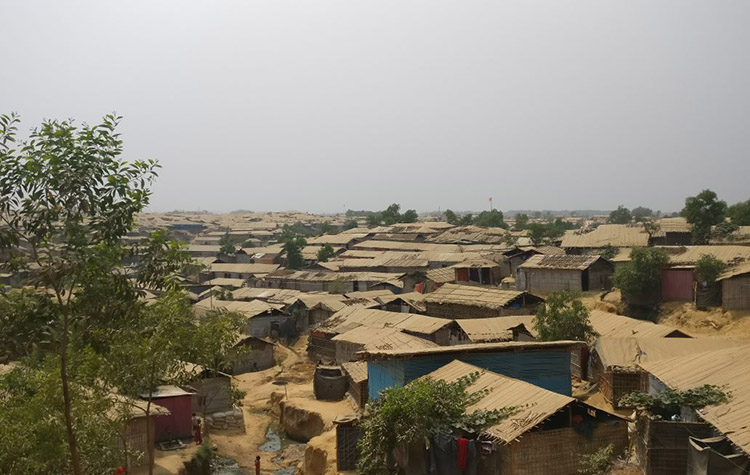(Bangkok/Dhaka, 31 March 2018) – The Asian Forum for Human Rights and Development (FORUM-ASIA), together with its members in Bangladesh, conducted a fact-finding mission into the situation of Rohingya refugees at Lambasia, Kutupalong, Balukhali and Thyingkhali makeshift camps of Cox’s Bazar on 24-28 March 2018. These camps house around 550,000 of the 695,000 Rohingya refugees who have arrived in Bangladesh since 25 August 2017.
The main objective of the mission was to assess the human rights and humanitarian situation on the ground, and the measures that have been taken to respond to the situation by various actors. As part of the mission, the team met with government authorities coordinating and managing the refugee camps, service providing agencies, local civil society organisations, human rights defenders and refugees themselves.
The Rohingya refugees interviewed, survived horrendous atrocities, including torture, sexual violence and mass execution. They also lost properties including foodstuff and livestock, as their houses were set on fire. The scale of the atrocities recounted by the refugees revealed clear patterns and elements of mass atrocity crimes (genocide, war crimes and crimes against humanity).
Considering the scale and magnitude of the crisis, the fact-finding mission understands that it is not an easy task to manage a crisis of this scale and magnitude. The fact-finding team would like to put on record the appreciation and gratefulness of the refugees receiving shelter and services provided by the people of Bangladesh, local and international communities.
The team was informed that the supply of essential commodities, such as rice, edible oil and pulses, were fairly distributed in the camps. Basic medical care was also available. However, the refugees indicated the requirement of specialised medical care for survivors of sexual violence and other complicated cases. As regards to sanitation and hygiene, insufficient toilets and water supply was visible. Some camps were seemingly vulnerable to landslides and floods. The refugees were not aware of relocation plans to deal with the upcoming monsoon and any preparation for repatriation.
On the basis of preliminary findings and observations, a detail report will be shared shortly, the fact-finding team would like to draw the attention of the Governments of Bangladesh, Myanmar, China, India, the Association of Southeast Asian Nations (ASEAN), and the international community to the following.
- Given that the primary responsibility to protect the Rohingya population lies with the Governments of Myanmar as the country of origin and Bangladesh as the host country, the fact-finding team urges the two Governments to critically engage in dialogue to find a sustainable solution to the Rohingya refugee crisis as soon as possible.
- The Government of Bangladesh and the international community should respect, protect and fulfil the human rights of the uprooted Rohingya, including the special needs of survivors of sexual violence, by strengthening, streamlining and sustaining their humanitarian response in the refugee camps, including a robust preparation to deal with the challenges posed by the upcoming monsoon season.
- The Government of Myanmar is duty-bound to initiate an effective and independent criminal investigation into the alleged mass atrocity crimes committed by the security forces and vigilante groups against the Rohingya people, and hold those responsible accountable. The international community should provide all support required in this regard.
- Preparation towards repatriation should involve the consultation with and participation of the Rohingya community in all stages to protect and safeguard their rights and interests. To this end, the international community, including China, India and ASEAN, should ensure a comprehensive and time-bound roadmap is developed and implemented.
***
For a PDF version of this statement, please click here.
For further information, please contact:
– South Asia Programme, FORUM-ASIA, [email protected]




